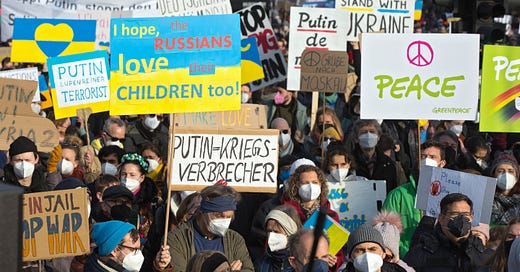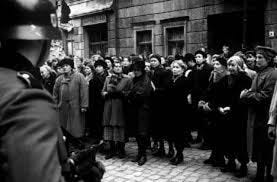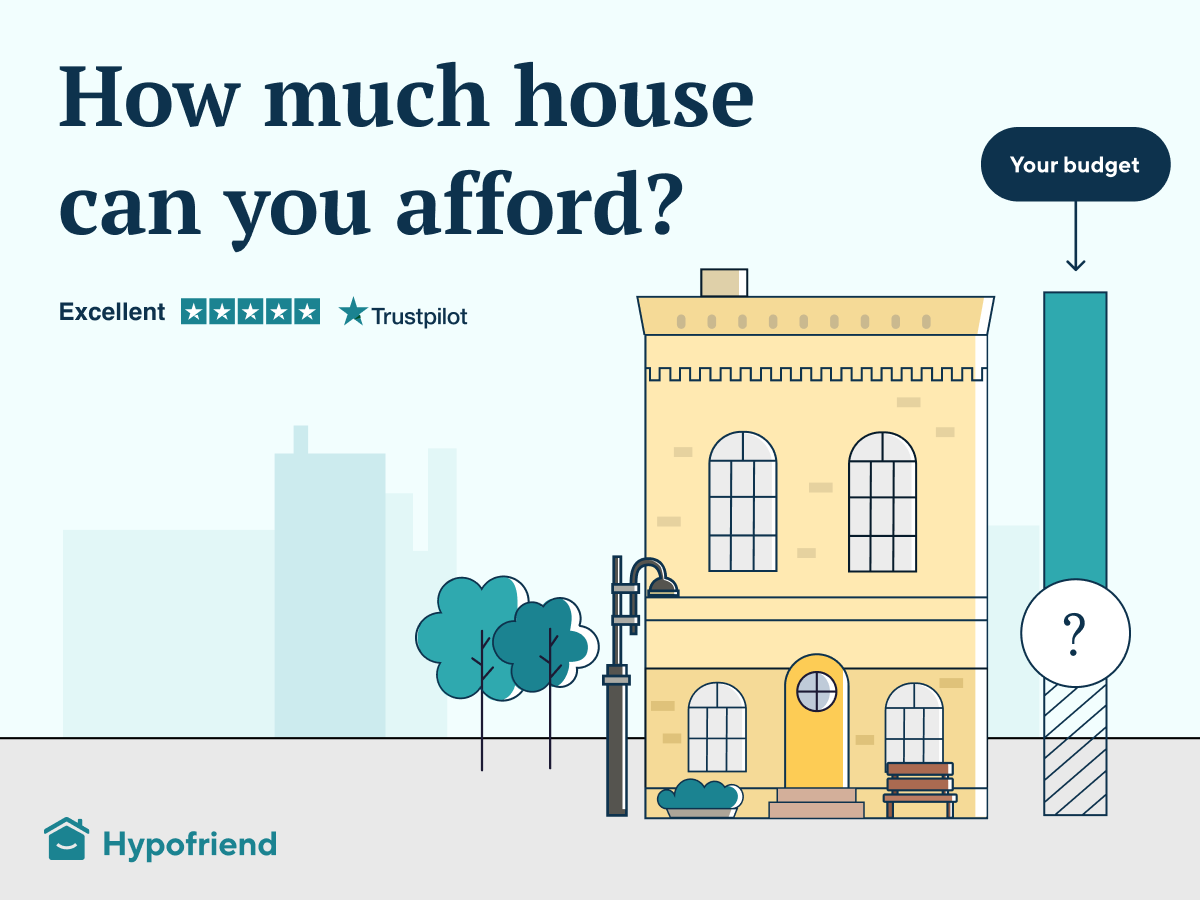#52: Germany & war, refugees, vax scam
Plus real ways you can help in the growing refugee crisis.
Dear 20 Percent readers,
Vladimir Putin’s invasion in Ukraine has blown a massive hole in our mostly peaceful European reality. Or, as a friend who works at a Berlin think-tank put it to me:
“We are witnessing a dramatic re-evaluation and shedding of our beliefs and certainties. Institutions that we once took for granted no longer exist. I cannot stress how dangerous the situation is and might further become. We are literally in a fog of war. Events are unfolding in unforeseen speed. The possible repercussions of decisions are difficult or even impossible to assess.”
Within a few days, the war being waged just two borders away has caused Germany to jettison central pillars of its foreign and defence policy. During a special session of the Bundestag on Sunday — as at least 100,000 people, possibly more, protested for peace at the Brandenburg Gate — Chancellor Olaf Scholz (SPD) said the war had thrown us into a new epoch. To the surprise of most present, he announced a €100 billion fund to modernise Germany’s armed forces, the Bundeswehr. The annual defense budget would be doubled to 2% of GDP, he added, something the US has been demanding for years. And after hesitating for weeks, Scholz is sending arms directly to Ukraine — 1,000 anti-tank weapons, 500 Stinger anti-aircraft missiles — abandoning the long-standing German notion that trade and diplomacy can prevent/solve every crisis.
Meanwhile, former chancellor Gerhard Schröder (SPD), a long-time friend of President Putin, is getting blowback for refusing to quit his executive posts at Russian fossil fuel companies. On Monday, the entire staff of his taxpayer-funded office, including long-time aid and speechwriter Albrecht Funk, reportedly resigned in protest.
The war could delay Germany’s transition to a carbon-neutral economy. Brandenburg’s premier Dietmar Woidke (SPD) said in a radio interview that closing down coal-fired power plants by 2030 was now impossible if Germany wanted to maintain a round-the-clock energy supply. Economy Minister Robert Habeck (Greens) told ARD TV he was looking into the option of extending Germany’s three remaining nuclear power plants to reduce dependency on Russian natural gas — till a few days ago considered a “bridge technology” to the path to 100% renewables.
Whatever happens, this war will bring massive change to the political and economic situation of our lives in Berlin — we’ll do our best to keep you up-to-date on all the ways this brutal turn of history affects life in the German capital.
More news below.
Maurice
The Berlin corona stats for Tuesday, March 1
Fully vaccinated: 76.6% (76.3% Friday)
Received booster: 58.1% (57.8% Friday)
New cases in one day: 6,389 (9,396 Friday)
Total deaths: 4,245 (+3 over Friday)
🔴 7-day Covid-19 incidence (cases per 100,000): 1,043 (1,137 Friday)
🔴 7-day hospitalization incidence (also per 100,000): 16.2 (18.5 Friday)
🟡 Covid-19 ICU patient occupancy: 12.7% (12.5% Friday)
Ukrainian refugees arriving in the city
The UN Refugee Agency estimates about half a million Ukrainians have fled their homes. By Monday, at least 400 had registered at Berlin’s office for refugee affairs. Authorities say they have approximately 1,300 free beds available in refugee homes while they look for more. Meanwhile, Deutsche Bahn is offering free-of-charge travel for Ukrainian passport holders on its trains in Poland running toward Germany. On Thursday, EU leaders are expected to agree on new rules that would give Ukrainian refugees full social protections and the right to work.
Berlin sends supplies
A German Red Cross (DRK) convoy of aid has left Berlin for Lublin in eastern Poland loaded with emergency supplies to support Ukrainian refugees on the move. The DRK says right now it needs cash donations more than anything. Below are the bank details of the DRK and three other German charities. Just write “Ukraine” as the Verwendungszweck in your online banking.
DRK: IBAN DE63370205000005023307, BIC BFSWDE33XXX
Caritas: IBAN DE88 6602 0500 0202 0202 02, BIC BFSWDE33KRL, Bank für Sozialwirtschaft Karlsruhe
Diakonie-Katastrophenhilfe: IBAN DE68520604100000502502, BIC GENODEF1EK1, Evangelische Bank
Ukraine Forum e.V.: IBAN: DE41 1005 0000 0190996099, BIC:BELADEBEXXX
Additionally, here’s a link to various ways you can help, from hosting refugees to becoming a volunteer driver: https://linktr.ee/ukrainehelpberlin
Dodgy vaccine certificates
Oh yeah, the pandemic. In a weird corona scam story, a retired German doctor who has been offering “ineligible-for-vaccination certificates” online for €17.49 now faces legal action. The certificates are aimed at anti-vaxxers hoping to keep their jobs in occupations where a corona jab is mandatory. Customers receive the certificate after filling out a brief questionnaire on whether they are allergic to ingredients in one of the Covid-19 üavaccines. In an odd twist, the organisation suing the doctor is the Good Governance Gewerkschaft, a “trade union” of a different stripe, headed by ex-local FDP politician and all-round troll Marcel Luthe. The organisation’s main aim appears to be fighting vaccine mandates for particular professions.
Record cash for start-ups
Awkward time to brag about how much investment you’re attracting, but Berlin Partner did just that on Monday. Presenting its annual report (“Comeback Berlin”, PDF, in German), the city marketing agency Berlin Partner said €10.5 billion in investment was ploughed into start-ups in the city last year. The capital is leaps and bounds ahead of Bavaria (€4.4 billion) on the investment league table. Berlin also bested London to top the 2021 Startup Heatmap, which surveyed about 1,300 founders about where they would most prefer to launch a company, according to dpa. It was the first time our city took first place ahead of 29 other cities, which does not bode well for our real estate market, unless you’re an owner and not a renter.
Angie robbed?
Former Chancellor Angela Merkel (CDU) was reportedly robbed while food shopping in Berlin last week. Merkel was shopping in a tony Charlottenburg grocery store — reportedly accompanied by a police bodyguard — when the world’s most adept thief made off with her purse, which had been draped off her shopping cart (does she use a €2 coin or a keepsake Kaiser’s token to get her carts?), according to Berlin media. Police confirmed that a 67-year-old woman reported such a crime to the Friedrichstraße police station in Mitte, where Merkel resides. The stolen purse contained an ID card, EC card, driver's license and cash. And let’s not forget the Illuminati membership card.
Factoid
February 27, 1943 saw the beginning of the Rosenstraße protests in Berlin - a key event of resistance against the Nazi regime. About 1,800 Jewish men, most of them married to non-Jewish women, had been rounded up by the Gestapo and herded into a Jewish community welfare centre at Rosenstraße 2-4 in Mitte to await deportation to death camps. Hundreds of women demonstrated against their husbands’ detainment day and night - until March 6, when Joseph Goebbels finally ordered the men’s release out of fear that the protests would spread.
👇 Check out our sponsor 👇
See what you can afford to buy in Berlin
The rise of Berlin as a startup capital has brought with it several externalities, one of them being a scarcity of apartments for both renting and living. With no end in sight, low interest rates make buying in Germany's capital still relatively affordable compared to other capitals around Europe. But interest rates may not stay low forever: use Hypofriend to check whether buying makes sense. Hypofriend is an online home buying platform with dedicated English-speaking mortgage brokers to help you find and finance your dream home.
Calculate what you can afford to buy.
Need to promote your business? Why not advertise on 20 Percent Berlin?







The simple fact is Germany is massively dependent on Russia for energy, not just gas but coal as well. As to the idea that industry could run a 100% on renewable (and let's not discuss the fact that 90% of homes are heated by oil/gas) is a pure pipe dream. Germans support the effort now but what happens when inflation turns out not to be transitory. High energy prices will feed into inflation?